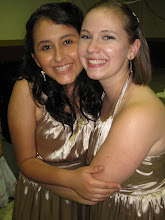Aside from the title being something that completely catches you off guard, I am already loving this book. It's by Rob Bell, and I highly recommend it. I've never really been a big fan of christian abstinence books. They all pretty much say the same thing: wait until you're married to have sex because that is the way it's supposed to be. And any teenager who's got hormones feels like a sinner for even thinking of asking why? The subject is kind of taboo. Nobody wants to talk about it. Just. . . don't do it.
But. . . why?
The reason I love SexGod is because Rob Bell really addresses the why behind the wait. Or as he frequently writes throughout his book, "this is really about that." His subtitle is Exploring the endless connection between sexuality and spirituality. Because this is really about that.
Here's a great passage:
There's Something Else Going on Here
There's a passage in the book of Ephesians where it's written, "Those who have been stealing must steal no longer. [Ephesians 4:28]".
Which is quite straightforward - don't steal. But the passage doesn't end there. It continues: "but must work, doing something useful with their own hands."
But it doesn't end there. It ends with: "that they may have something to share with those in need."
On first read, the instructions seem as basic as it gets. But there is much going on here just below the surface.
First, the command doesn't stop with the "don't" part. The writer understands that that kind of instruction rarely helps. When we're told not to do something, how often are we truly compelled not to do it, especially if we enjoy it? If it's just me against the lust, the odds are always against me.
But there's something else going on here.
Stealing involves large amounts of adrenaline. The rush of planning, pulling it off, not getting caught, getting something for nothing. And then there's the expectation of next time. If we got something this significant for free, could we steal something even more valuable? What if we raised the stakes, hit a store with a better security system, tested ourselves? Stealing involves the senses, the intellect, a person's fear threshold. It even has a powerful social dynamic. Stealing with someone creates a powerful bond between people. When our adrenaline is pumping, that's a physiological phenomenon. It feels good because things are happening with the chemicals in our bodies, with our nerves and brain and bloodstream. If we do that enough, our bodies get used to it.
We could use the word addicted. A person gets addicted to it.
if you tell the person who's stealing not to, and you leave it at that, you've taken something away, but you haven't replaced it with anything. That's why the instructions in Ephesians are so brilliant. The urging to stop stealing is followed by the command to have the person do "something useful with their own hands." The word useful is the Greek word agathos, which is also translated "good" and "benevolent".
Why does the writer mention the hands?
Because you steal with your hands. Stealing is a sensory experience, an adrenaline rush involving the hands. The command is to replace one adrenaline rush with another, a better one, one that's good. But it doesn't stop there. The command ends with the person who was stealing learning to do something good with their hands so that they can take care of the needs of someone else. Stealing is about taking from someone. This passage is about giving to someone who has less because you have more.
This passage is about something central to what it means to be human: it's about desire. It's about the thief finding something they'll desire more than stealing.
"You thought taking things for free was a rush? Try giving free food to someone who's starving."
Whatever it is that has its hooks in you, you will never be free from it until you find something you want more. It's not about getting rid of desire. It's about giving ourselves to bigger and better and more powerful desires.
What are you channeling your energies into?
Because they will go somewhere.
Maybe it's as simple as asking God to show it to you, to give it to you, to make you aware of it.
What is it you've given your life to?
Life is not about toning down and repressing your God-given life force. It's about channeling it and focusing it and turning it loose on something beautiful, something pure and true and good, something that connects you with God, with others, with the world.
What do you want more?
